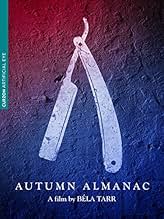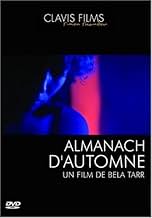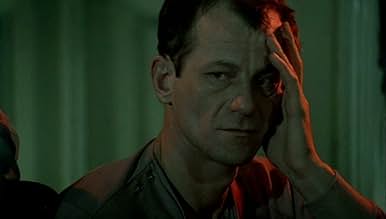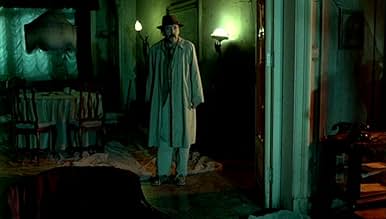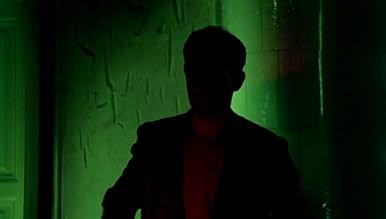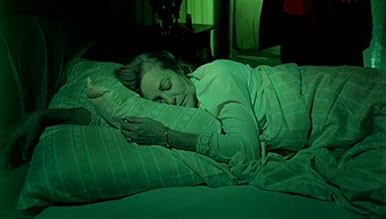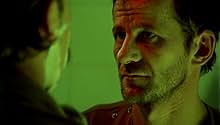Öszi almanach
- 1984
- 1h 59min
CALIFICACIÓN DE IMDb
7.1/10
1.7 k
TU CALIFICACIÓN
Agrega una trama en tu idiomaA large, claustrophobic apartment is the setting for this intense chamber drama. In this dense setting, the inhabitants of the apartment reveal their darkest secrets, fears, obsessions and h... Leer todoA large, claustrophobic apartment is the setting for this intense chamber drama. In this dense setting, the inhabitants of the apartment reveal their darkest secrets, fears, obsessions and hostilities.A large, claustrophobic apartment is the setting for this intense chamber drama. In this dense setting, the inhabitants of the apartment reveal their darkest secrets, fears, obsessions and hostilities.
- Dirección
- Guionista
- Elenco
- Premios
- 2 premios ganados en total
- Dirección
- Guionista
- Todo el elenco y el equipo
- Producción, taquilla y más en IMDbPro
Opiniones destacadas
Almanac of Fall is a series of dull, open-ended one-on-one conversations between a handful of people living in a large house. Each of these people is absolutely miserable, mostly because they all have contempt for one another. The rare times when any individual seems to exhibit any tenderness towards someone else it's inevitably shown to have been an attempt at manipulation, usually in some back-handed attempt at making money off the old woman who owns the house. Violence breaks out several times but it's rarely any more toxic than the conversation.
This film is pretty obviously influenced by the stagy chamber dramas of Ingmar Bergman: every last shot is of the interior of the house. Fortunately, Tarr manages to transcend this influence and make the film his own. No possible camera angle is left unexplored; in one memorable scene the action is shot from below with the use of a glass floor. This is apparently the only color film Tarr has ever made and he took full advantage as he used a multitude of brightly colored lights to give the action a garish intensity. Tarr took inherently uncinematic, dialogue heavy material and transformed it into a film that takes full advantage of the unique possibilities of the medium.
This isn't a film that I enjoyed on any level but I can't deny the artistry with which it was made. For fans of Bergman and/or Tarr's other films this should prove to be quite rewarding.
This film is pretty obviously influenced by the stagy chamber dramas of Ingmar Bergman: every last shot is of the interior of the house. Fortunately, Tarr manages to transcend this influence and make the film his own. No possible camera angle is left unexplored; in one memorable scene the action is shot from below with the use of a glass floor. This is apparently the only color film Tarr has ever made and he took full advantage as he used a multitude of brightly colored lights to give the action a garish intensity. Tarr took inherently uncinematic, dialogue heavy material and transformed it into a film that takes full advantage of the unique possibilities of the medium.
This isn't a film that I enjoyed on any level but I can't deny the artistry with which it was made. For fans of Bergman and/or Tarr's other films this should prove to be quite rewarding.
Essentially a series of close, intimate conversations between people living together in a flat. Wonderfully human. The occupants are an elderly woman, her son, the mother's nurse, her boyfriend and a tenant. We see them argue, fight and love. Many fabulous performances. Can't recall the last time I was this drawn into a film.
Very unlike anything I've seen from Tarr. A reminder that the most cinematic of all landscapes is a face. Never leaving the apartment, it's the faces, the dwelling shots of their emotions and the emotional complexity of their relationships that drives this truly marvelous hidden gem. It has a welcoming tone, at least at first, though the atmosphere is cold, and kept getting colder as the situation got less and less pretty. No extensively long takes either, though it remained hypnotic all the same, hell, in my case even more so. I could not take my eyes away. 9.5/10.
Very unlike anything I've seen from Tarr. A reminder that the most cinematic of all landscapes is a face. Never leaving the apartment, it's the faces, the dwelling shots of their emotions and the emotional complexity of their relationships that drives this truly marvelous hidden gem. It has a welcoming tone, at least at first, though the atmosphere is cold, and kept getting colder as the situation got less and less pretty. No extensively long takes either, though it remained hypnotic all the same, hell, in my case even more so. I could not take my eyes away. 9.5/10.
9ozus
The occupants of a large apartment desperately try to relate with each other: fighting over financial matters, trying to establish their sovereignty, revealing their fears and their loneliness, grasping for love, all the while clinging to each other and hating themselves for it. To say that this a harsh tale, is to really note how bleak their lives are, how grim the large apartment is, and how unsatisfying is their love life and everything around them.
Tarr's camera is everywhere, under them, over them, close-up and panning the room. His choice of colors for the grim apartment is curious and provoking. This is a tough film to watch, but if you want to see something that is introspective, something that has a rawness to it that is uncompromising, then this existential-like film fits the bill, as it generates an uncomfortable and uncompromising tension that is very perceptive about the human condition. Above all, its message is, you must love someone, which is easier said, than done, as the filmmaker subtly asks the question, what is it that you believe in?
Tarr's camera is everywhere, under them, over them, close-up and panning the room. His choice of colors for the grim apartment is curious and provoking. This is a tough film to watch, but if you want to see something that is introspective, something that has a rawness to it that is uncompromising, then this existential-like film fits the bill, as it generates an uncomfortable and uncompromising tension that is very perceptive about the human condition. Above all, its message is, you must love someone, which is easier said, than done, as the filmmaker subtly asks the question, what is it that you believe in?
Having first experienced the magic of Béla Tarr's direction in Werckmeister Harmóniák, I was completely entranced by what I still—over a year on—consider the greatest film I've seen. Having seen only Kárhozat since then, I'm not sure what it was that took me so long to get to something else by the Hungarian auteur.
Hédi is the wealthy landlady of a house in which resides her money-demanding son János, her nurse Anna and Anna's boyfriend Miklós, and the elderly and financially troubled teacher Tibor.
The film opens with a quote from Pushkin, referring to the devil's leading of us in circles. This film could be classified as the last of Tarr's first cycle, his every follow-up a collaboration with writer László Krasznahorkai and an exercise in the art of the extreme long take which has characterised his later cinematic career. Knowing only the films of that second cycle, Öszi Almanach presented an exciting opportunity: to see a Tarr film in colour! A devout disciple of his monochrome aesthetic, I was very curious to see what he could do when working with a wider range of pigments. Indeed, it is the colours which one first notices in this film, their usage unusual, atypical, and highly interesting. Many scenes are abundantly blue in hue, appropriately matching the mood of the dilapidated house the film, and its five characters, call home. What is interesting is the appearance of red in these scenes, one character more often than not basked in an ethereal crimson glow apparently at odds with the ambient aquamarine of all else around them. The lighting is certainly a far cry from naturalistic, and one never thinks for a moment that these colours are literal approximations of the many lamps which dot the scenes, rather a metaphysical appropriation of the contrasts, conflicts, and juxtapositions which are the film's relationships. Five characters make for ten propinquities, and each of these is explored in fascinating and comprehensive detail, as well as an objective ambiguity which questions the sincerity of their words, actions, and postulated feelings. Tarr's camera observes often from a distance, whether through a doorway from an adjacent room or from beneath a table, as though cowering, lending credence to the characters' regular ruminations on inflicting harm, even death, upon their fellow occupants. When it is not hiding, the camera circles, slowly encompassing the one-on-one conversations which make up the majority of the film. Twice it attempts particularly unusual angles, as though Tarr is struggling to find a position from which he can understand these characters and the deceit which is so tragically central to their lives. A claustrophobic film, our confinement within the walls of the home suggests a similar imprisonment for the characters, the arrival of three wordless policemen the only glimpse of the wider world we get; not even a window is shown. The house's "family" offers a comment on such, and other, social structures, and the bizarre reality of our alignment to people we purport to hate. The film's final scene, a circular movement which takes in circling dancers, reminds us of the opening quote, and leads us to question if anything has really changed at all. Though virtually without comedy, this conclusion saw me burst out in laughter: perhaps the strangest, most visceral reaction a film has yet provoked from me.
An intriguing look at the bizarreness of humanity's interactions, selfishnesses, and contradictions, Öszi Almanach is more dialogue heavy then Tarr's later works—not a negative considering the strength of these analytical observational conversations. Poetic like all from this filmmaker, a typically beautiful score from Mihály Vig tops off this quiet, contemplative drama that would—were it from just about anyone else—be called a crowning masterpiece.
Hédi is the wealthy landlady of a house in which resides her money-demanding son János, her nurse Anna and Anna's boyfriend Miklós, and the elderly and financially troubled teacher Tibor.
The film opens with a quote from Pushkin, referring to the devil's leading of us in circles. This film could be classified as the last of Tarr's first cycle, his every follow-up a collaboration with writer László Krasznahorkai and an exercise in the art of the extreme long take which has characterised his later cinematic career. Knowing only the films of that second cycle, Öszi Almanach presented an exciting opportunity: to see a Tarr film in colour! A devout disciple of his monochrome aesthetic, I was very curious to see what he could do when working with a wider range of pigments. Indeed, it is the colours which one first notices in this film, their usage unusual, atypical, and highly interesting. Many scenes are abundantly blue in hue, appropriately matching the mood of the dilapidated house the film, and its five characters, call home. What is interesting is the appearance of red in these scenes, one character more often than not basked in an ethereal crimson glow apparently at odds with the ambient aquamarine of all else around them. The lighting is certainly a far cry from naturalistic, and one never thinks for a moment that these colours are literal approximations of the many lamps which dot the scenes, rather a metaphysical appropriation of the contrasts, conflicts, and juxtapositions which are the film's relationships. Five characters make for ten propinquities, and each of these is explored in fascinating and comprehensive detail, as well as an objective ambiguity which questions the sincerity of their words, actions, and postulated feelings. Tarr's camera observes often from a distance, whether through a doorway from an adjacent room or from beneath a table, as though cowering, lending credence to the characters' regular ruminations on inflicting harm, even death, upon their fellow occupants. When it is not hiding, the camera circles, slowly encompassing the one-on-one conversations which make up the majority of the film. Twice it attempts particularly unusual angles, as though Tarr is struggling to find a position from which he can understand these characters and the deceit which is so tragically central to their lives. A claustrophobic film, our confinement within the walls of the home suggests a similar imprisonment for the characters, the arrival of three wordless policemen the only glimpse of the wider world we get; not even a window is shown. The house's "family" offers a comment on such, and other, social structures, and the bizarre reality of our alignment to people we purport to hate. The film's final scene, a circular movement which takes in circling dancers, reminds us of the opening quote, and leads us to question if anything has really changed at all. Though virtually without comedy, this conclusion saw me burst out in laughter: perhaps the strangest, most visceral reaction a film has yet provoked from me.
An intriguing look at the bizarreness of humanity's interactions, selfishnesses, and contradictions, Öszi Almanach is more dialogue heavy then Tarr's later works—not a negative considering the strength of these analytical observational conversations. Poetic like all from this filmmaker, a typically beautiful score from Mihály Vig tops off this quiet, contemplative drama that would—were it from just about anyone else—be called a crowning masterpiece.
¿Sabías que…?
- TriviaThe scene in which the camera is positioned below the characters' feet was the idea of cinematographer Sándor Kardos. A special sheet of glass was made for the shot which was tested by stunt men before the actors stepped on it. Because the camera couldn't move properly under the glass a huge mirror was positioned in front of it and the cameraman filmed the image of the mirror instead of the actual set.
- ErroresAs Hedi and Anna fight over the bed, the boom mic moves across the top left corner of the frame.
Selecciones populares
Inicia sesión para calificar y agrega a la lista de videos para obtener recomendaciones personalizadas
- How long is Almanac of Fall?Con tecnología de Alexa
Detalles
Contribuir a esta página
Sugiere una edición o agrega el contenido que falta

Principales brechas de datos
By what name was Öszi almanach (1984) officially released in India in English?
Responda
